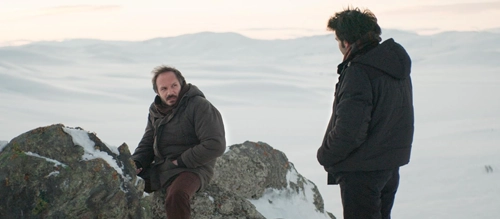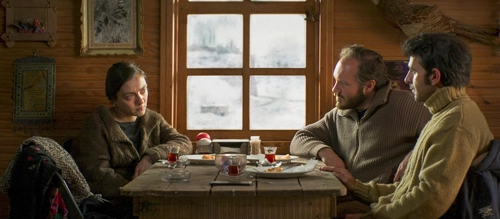
About Dry Grasses (2023)
Director: Nuri Bilge Ceylan
Screenwriters: Nuri Bilge Ceylan, Ebru Ceylan, Akın Aksu
Starring: Deniz Celiloğlu, Merve Dizdar, Musab Ekici
With six of his feature films selected to represent Turkey for the Academy Award for Best International Feature Film, and having previously won the Palme d’Or for his 2014 effort Winter Sleep, the announcement of Nuri Bilge Ceylan’s latest film About Dry Grasses in this year’s Glasgow Film Festival programme was a big one. Focusing on a teacher accused of abusing a student, Ceylan’s most recent picture aims to delve into the human psyche. So much so that the three-plus hour runtime works almost like a challenge; can you survive?
Set in rural eastern Anatolia, Turkey, the film takes place in the starkest of winters, where it snows non-stop and all that can be seen is a blanket of white. No detail can be seen across the vast landscape which the film photographs so beautifully; a reminder of the dangers that hide in plain sight.
With such a lack of detail in the landscape, the film encourages you to focus more succinctly on the characters, their words, and their actions. Furthermore, the film being shot in such an unostentatious way brings more attention to the sound. Deliberately choosing to feature no music throughout the film, Ceylan delivers a story in which the silence is deafening and we truly notice when that silence is broken by a phone, a knock, or the snow that forever surrounds the characters. Though Ceylan’s ability to heighten the senses is effective, the actors are left without many of the usual techniques that would heighten their performances.
Even so, they cast do a fantastic job of carrying the material. Deniz Celiloğlu is excellent as Samet, the film’s protagonist transferred from Istanbul to a post in the film’s remote village. Celiloğlu does a wonderful job committing to the performance, sucking us in with his natural charm before beginning to make us question almost every aspect of his past and his personality – the smallest of body movements or intonations are all under microscopic inspection until there is no ambiguity left. Ece Bağcı is equally as good as Sevim, the young student who accuses her teacher of being inappropriate around her. Their scenes together are especially great, not so much because of the answers they provide but because of the questions they raise.

Can Samet survive his time in the village, or will the brutal conditions wither him down to just a husk? Can he survive the allegations? Is he guilty or innocent? Can Sevim escape the clutches of her apparent abuser? Will she ever make it out of this village at all? These are the questions that are constantly in the back of your mind, all the while masterfully sewn throughout the screenplay, gently reminding us of the character’s actions and the consequences that may follow.
Throughout the film, some scenes trail away from the key plot points, simply being used to further inspect the film’s characters, as well as the rest of the town’s occupants. It can lead to some funny moments of dark humour or as a way of commenting on how the rest of the town responds to these rumours, but generally these meandering moments do force us away from the really interesting story of accusation at the heart of what we’re seeing.
In a similar vein, there is a subplot that involves a love triangle between Samet, his roommate and colleague Kenan (Musab Ekici), and Nuray (Merve Dizdar), a teacher in a neighbouring village who was a guerrilla fighter before a terrorist attack caused the loss of her leg. The section certainly adds more to the character of Samet, opening up questions as to why he suddenly cares about Nuray, why he wasn’t interested in her in the first place, or what his intentions are. Furthermore, conversations between the three take us deeper into his psyche; how he sees himself, how he sees the world. It is clear that Ceylan and his fellow screenwriters wish to study the character more than the events, and this is effective for the most part, though at times it can feel as though the story drifts away from itself to the point that we question if it will ever return.
Whilst some moments work a little more effectively than others and some areas could have been trimmed down, the screenplay is tightly packed, with every element working together to make About Dry Grasses as good as it is.
About Dry Grasses is a dense and epic study of a character who deserves all two hundred minutes of the runtime. Although some areas work better than others, every piece of the puzzle comes together to create a picture so complex that it is a piece of art you’ll likely appreciate more than enjoy. About Dry Grasses is an excellent example of the depths of the human soul that can be explored through filmmaking.
Score: 17/24
Also from Glasgow Film Festival: The Beast Review

